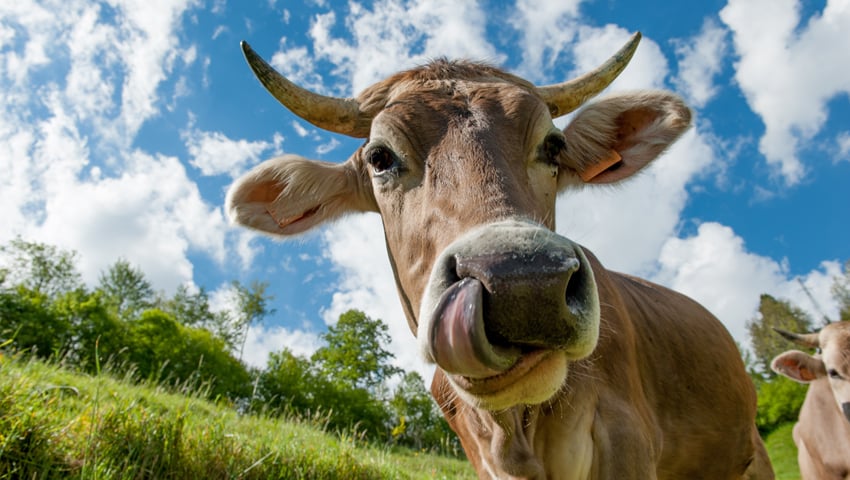Journalist Joe Fassler wrote recently that five myths are used by the US beef industry to persuade the public that meat eating has a negligible impact on the planet – but these myths are themselves built on mythology. This week, Chris Smaje, author of Saying NO to a Farm-Free Future, unpicks the truth.
Fassler myth two: methane is different – and it isn’t the problem
METHANE – which, rather than carbon dioxide, is the main greenhouse gas associated with livestock agriculture – is different, for a reason that Fassler outlines in his article. Methane doesn’t persist in the atmosphere long-term, whereas carbon dioxide does. Whether you consider it a problem or not depends a lot on how you weigh the shorter and longer-term consequences of these emissions.
Critics of livestock agriculture are apt to be dismissive of a newer way of comparing methane and carbon dioxide emissions, known as GWP*, as if it’s some kind of industry ploy. But it is important, and it calls into question some of the figures Fassler cites in his article to buttress his case against livestock. One of its implications is that the critical question is not so much the numbers of methane-producing ruminant livestock but changes in the numbers. Increase them, and you’re contributing to global heating. Decrease them, and you’re contributing to global cooling. Keep them steady, and the impact is slight.
One argument is that we’re in a climate emergency so we need to do whatever it takes to cut greenhouse gases, and that includes cutting livestock herds to reduce methane emissions. I could get behind that if I was seeing evidence of the same urgency in other economic sectors, but methane emissions from fossil energy – which exceed those from livestock – are climbing ever upwards. A recent Guardian article [https://www.theguardian.com/world/2023/may/09/mind-boggling-methane-emissions-from-turkmenistan-revealed] reported that methane leaks “which should be easy to fix” from the two main fossil fuel fields in Turkmenistan alone exceed the UK’s entire emissions.
On a recent journey across the UK, I saw aeroplanes quartering the sky, huge diesel-powered construction plant widening a motorway, and an even huger cruise liner disgorging hundreds of passengers. So if I were a livestock farmer in a UK or US sector where livestock numbers have in any case been falling, I think I’d wonder why so much fuss and so many accusatory articles were singling out my paltry efforts in the face of all this frenzied methanogenesis in the wider economy that passes almost without comment.
One answer, I think, is that it’s quite easy for people to cut down or cut out meat without otherwise challenging fossil-fuelled business as usual and to be reassured that in this way they’re doing their bit to stop climate change. Meanwhile, not only are the methane emissions of the fossil energy sector that underpin the whole of the rest of the economy continuing largely unabated, but this sector’s carbon dioxide emissions are precipitating disastrous climate change in the longer term. In this sense, the anti-livestock methane argument is a narrative of prevarication that gets its priorities badly wrong – eat less meat for a little bit of cooling right now and the devil take the future.
Read Smaje’s response to Myth one: fossil fuels
Read Smaje’s response to Myth three: beef
Read Smaje’s response to Myth four: cattle
Read Smaje’s response to Myth five: future tech
Further reading:
Study indicates reduced warming effect of methane
Lab-grown meat up to 25 times worse for climate than beef
Farm Gate podcast: Ruminant methane, global warming and GWP*
